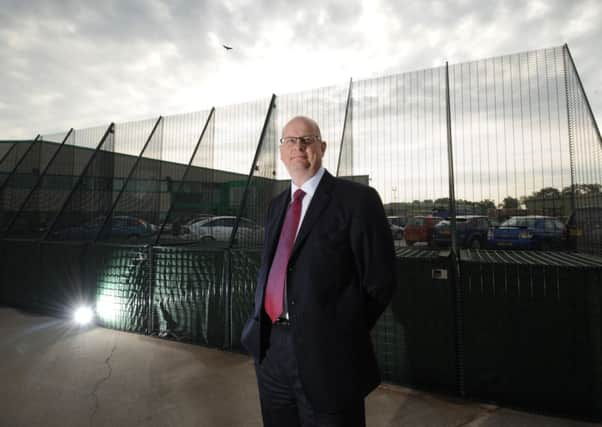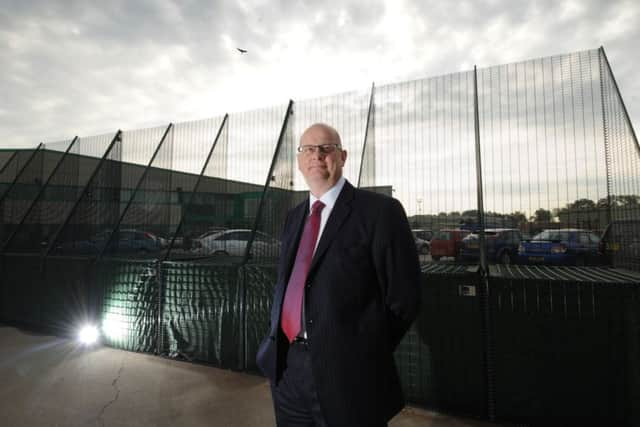Firm that sheltered Army now ready to shield FBI


Hesco has bought Reed Composite Solutions (RCS), a specialist manufacturer of ballistic plate protectors, which is based in Washington state in the US.
It’s part of a strategy of diversification for Hesco, which was founded by the late philanthropist Jimi Heselden, and has suffered a fall in revenues following the UK’s military withdrawal from Afghanistan.
Advertisement
Hide AdAdvertisement
Hide AdLeeds-based Hesco Bastion makes the blast wall basket, which replaced sandbags as protection for soldiers.


Camp Bastion, the British military base in Afghanistan, was named after the firm. The firm’s protective barriers can also be used to protect oil engineers, UN peacekeepers and remote villagers from flooding.
In the year ending January 31 2014, Hesco Bastion reported turnover of £20m, compared with the previous year’s figure of £33m. However, profit before tax still increased to £4.5m from £4.1m last year, as Hesco adapted to the changing economic climate.
The acquisition of RCS, which is rebranding as Hesco Armor, could lead to more jobs being created in Leeds.
Advertisement
Hide AdAdvertisement
Hide AdMike Hughes, Hesco Bastion’s chief executive, said: “It produces hard armour that is used by US law enforcement as well as military, so for us that’s quite a side step in terms of the types of business that Hesco has done historically, although it does fit very neatly with the vision of the business which puts materials between people and harm’s way.
“We have contracts with local law enforcement and US coastguard and various other agencies that supply the FBI within the US.
“The FBI have bought some of our product over there. I would anticipate that Hesco Armor is a first step for Hesco with a view to expanding our portfolio, so that would give us the opportunity for other acquisitions in the US and maybe elsewhere, depending on world demand.”
In the past, Hesco has played a significant role in protecting British troops on the ground in places like Afghanistan.
Advertisement
Hide AdAdvertisement
Hide AdMr Hughes said: “We’ve seen a lot of boots on the ground historically.
“All the noise and information that comes to us, which we keep a close eye on, seems to indicate that if there are to be any boots on the ground (in the future), it’s going to be far smaller numbers; it’s going to be more incursions going in and coming out.
“It doesn’t stop the requirement for our core product, but it’s likely to be a lot lower in terms of requirement. We keep a close eye on all issues of conflict around the world.”
Mr Hughes said that significant new product innovations were also taking place in the UK.
Advertisement
Hide AdAdvertisement
Hide AdNew products manufactured at the Leeds site, which employs around 100 staff, include a new flood product called the Jackbox.
Mr Hughes added: “Hesco continues to work in environmental and flood protection projects across the world.
“Jackbox demonstrates our new focus on diversification. We are also continuing our work with leading international humanitarian and peacekeeping organisations.”
He said that “the more troubled parts of Africa” remained one of the company’s key markets, and Mr Hughes hoped to see turnover of more than £20m for the current financial year.
Advertisement
Hide AdAdvertisement
Hide AdThe product portfolio could also include shields and helmet as it continues to diversify.
“Over the last couple of years, we’ve got quite good traction into oil and gas.
“It tends to be in troubled areas such as Yemen and Libya and other north African countries, where we are effectively putting protection around the exploration workers’ facilities,’’ he said, adding: “What we have been trying to do is achieve stability for the business and give consistency and confidence to the workforce.”
Mr Hughes said the company had taken “timely action” to identify the changes that were needed to ensure that it maintains its position as the market leader in defence products.
He added: “We have delivered on our promise to focus on investment and product innovation.”